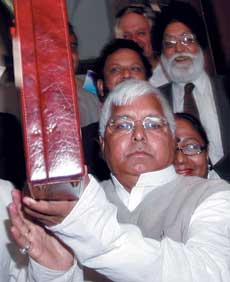NEW DELHI, 27 February 2007 — Indian Railway Minister Lalu Prasad yesterday announced record profits, slashed passenger fares and promised cleaner trains as he scripted a new chapter of the once loss-making juggernaut that moves about 14 million passengers daily.
The most striking part of Lalu Prasad’s rail budget presented in the Lok Sabha, the lower house of Parliament, was the profit of over Rs.215.78 billion ($4.5 billion) he announced for the current fiscal ending March 31 and a 14 percent growth in passenger and 17 percent in freight traffic, despite stiff competition from low-cost carriers and truckers.
“I have a tremendous sense of pride and gratitude...The railways are poised to create history by generating a cash surplus before dividend of Rs.200 billion as against Rs.140 billion the previous year.
“This is the same railway that defaulted on payment of dividend and whose fund balances had dipped to Rs.3.59 billion in 2001,” Lalu Prasad proclaimed loudly in the course of a 31-page, 116-minute speech that was greeted with thumping of desks from the treasury benches and constant interruption from the opposition.
In his fourth successive budget presentation, Lalu Prasad, whose turnaround strategy for the railways has become a case study for management schools including Harvard, also announced 32 new trains and reduced fares in air-conditioned cars, even as he laid emphasis on improving hygiene and cleanliness.
The network now runs nearly 12,000 trains, including over 9,000 passenger trains, across a 60,000 km network. It is the largest rail network in the world under a single management.
“The boundless affection and patronage of the people has helped railways stage a turnaround. In recognition of this, I announce a reduction of Re.1 per passenger in the daily ticket fares of nonsuburban ordinary passenger and nonsuper-fast mail-express trains,” he said.
He also announced a “Cleanliness Year” for 2007-08. A special campaign will be launched to ensure cleanliness and hygiene at station premises, in passenger trains, on railway lines and in waiting rooms.
He unveiled new sleeper class coaches with 4 percent reduced fare. Another highlight was a new set of air-conditioned chair cars and three-tier coaches in which fares would be 4 percent lower during peak and 8 percent less in off-peak seasons.
Similar, across-the-board fare reductions were also announced in other classes. “On popular demand, I have decided that super fast surcharge levied on second class tickets for super fast trains shall be reduced by 20 percent.”
The colorful politician from Bihar also announced other customer-friendly measures, notably the sale of e-tickets at gas stations and from automatic teller machines as well as concessions for women, senior citizens and the physically challenged.
He introduced 32 new trains, eight more “garib raths” (trains for the poor), extended the run of 23 trains and increased the frequencies of 14 others. “We have shown that one can earn even while serving the common people, by playing the volume game. Continuing this approach in 2007-08 we will add another 800 coaches in popular trains.”
Lalu Prasad referred to the Feb. 18 bombing of the Delhi-Attari Link Express to Pakistan near Panipat and the July 2006 blasts in Mumbai’s suburban services, and said security would be a top priority for the railways.
“Besides increasing the number of trained dogs in existing dog squads, in many sensitive divisions of the country explosive detection devices, door frames and hand held metal detectors are being installed to provide better security.”
Describing the rail budget as “growth-oriented,” Finance Minister P. Chidambaram said: “This has shown the way how growth can benefit all.” Welcoming the cut in freight rates, Jindal Stainless Ltd Director N.C. Mathur said: “The move would directly benefit the consumers as well as the industry.”
“This is good news for India and we wish that other public service areas like education and health would also follow the railway example. The minister’s thrust on modernization, technical innovation and better resource utilization should lead to higher market share in both goods and passenger segments for the railways,” FICCI (Federation of India Chambers of Commerce and Industry) President Habil Khorakiwala said on the decision to cut passenger fares, while leaving freight rates largely unchanged.
Unprecedented Acrimony
in Parliament Over Quattrocchi
Parliament was yesterday rocked by the opposition parties creating a ruckus in both houses over what it called delays in extraditing Italian businessman Ottavio Quattrocchi, arrested in Argentina on Feb. 6 for his alleged role in the Bofors gun payoff scam.
Lalu Prasad had a tough time presenting the budget as MPs belonging to the Bharatiya Janata Party (BJP) and some of its allies disrupted the proceedings by hooting and loud sloganeering.
Samajwadi Party MPs, who have just withdrawn their outside support to the United Progressive Alliance (UPA) government, were in the well for the initial 10 minutes and then walked out of the house.
The BJP MPs, who were in the well when the proceedings resumed at 12 noon, started targeting Sonia Gandhi after half-an-hour, during which Lalu Prasad single-handedly tried to overcome the loud slogan shouting.
Immediately after he read out his budget speech, a smiling Manmohan Singh went up to the railway minister’s seat and shook hands with him.
However, the BJP MPs managed to provoke some of the treasury benches. When they shouted “Quattrocchi is Sonia’s brother”, some Congress MPs like nonconventional Energy Minister Vilasrao Muttemwar, ignored Parliamentary Affairs Minister Priya Ranjan Dasmunshi’s warnings and started shouting slogans against BJP leaders.


